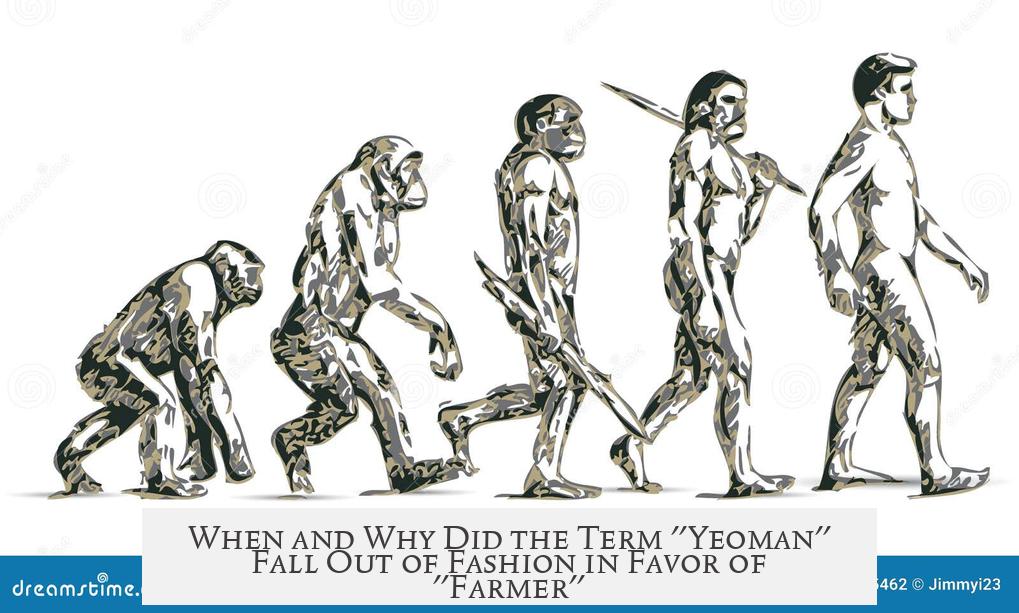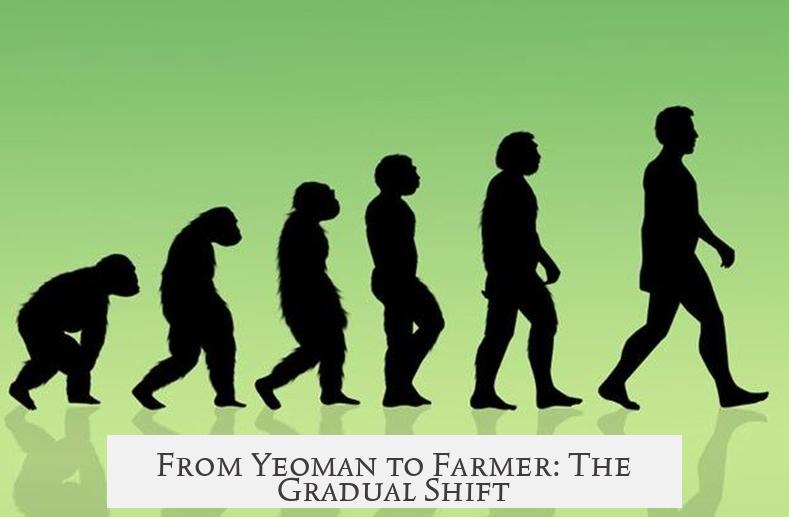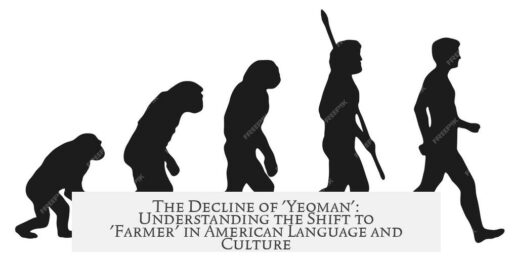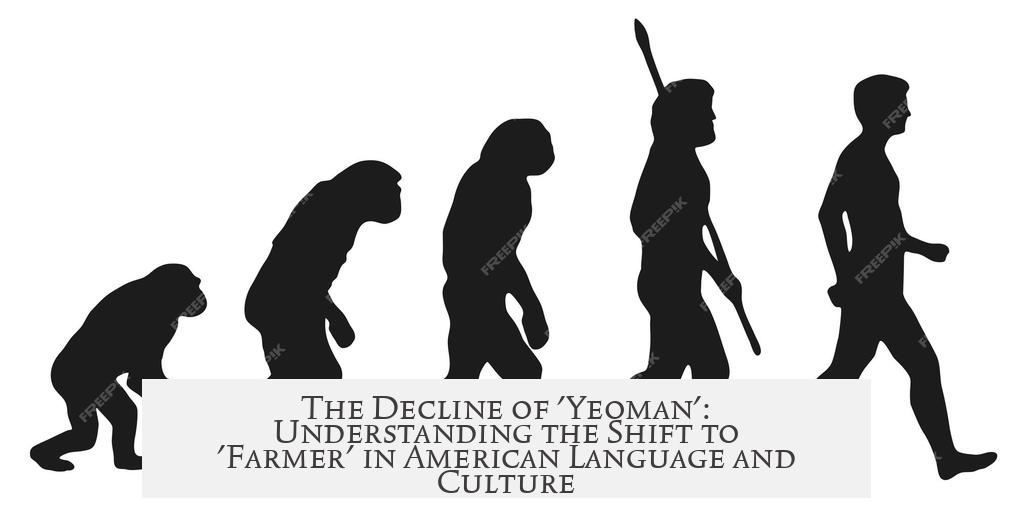The term “yeoman” gradually fell out of fashion in favor of “farmer” between the 17th and 18th centuries as social and economic contexts evolved in America. Initially, large landowners with roots in the Old World identified as yeomen to emphasize their status and property ownership. Over time, this designation became less relevant, and “farmer” emerged as the common term.
In the 1600s and early 1700s, yeoman described a class of landowners who possessed modest but significant property. These men often prided themselves on owning and cultivating their land without the reliance on hired labor, distinguishing themselves from both tenant farmers and the gentry. This term carried connotations of independence and respectability.
Large landowners in America, especially those descending from European yeoman stock, maintained this identification well into the 18th century. Using “yeoman” reflected their heritage and social aspirations, connecting their New World status to that of the Old World.
However, as American society developed, agricultural practices and social structures shifted. Landholdings changed in size and management style, and the importance of the yeoman class diminished. The term “yeoman” gradually lost its social and economic significance.
Consequently, “farmer” became the preferred, straightforward term for those engaged in agriculture. It lacked the class implications of “yeoman” and was applicable regardless of land size or social status. This shift represented a simplification and democratization of agricultural identity.
In summary:
- The term “yeoman” remained popular among large landowners during the 17th and early 18th centuries.
- It emphasized ownership, independence, and social status rooted in Old World tradition.
- Over time, changing social and economic realities reduced the term’s relevance.
- Farmers increasingly used the term “farmer,” which was more inclusive and practical.
- The change reflects broader shifts in American agricultural and social life.
When and Why Did the Term “Yeoman” Fall Out of Fashion in Favor of “Farmer”?

The term “yeoman” faded from common use and gave way to “farmer” mainly as the social and economic conditions that defined ‘yeomanry’ changed. In short, it stopped being relevant as land ownership opened up and social distinctions blurred, especially in America. Let’s dig deeper into the fascinating journey of these terms and why “farmer” became the preferred label.
First, it’s important to grasp that the words “yeoman” and “farmer” never meant exactly the same thing, even back in their heyday.
Yeoman: Not Just a Farmer, But a Title
In the Old World—especially England—the word yeoman was a social marker. It referred to a man who owned at least 40 acres of freehold land. This wasn’t just about farming; it was about status. Owning such land qualified a man to vote, which was a big deal back then.
To put it plainly: the yeoman was a property-owning, respectable middle-class landholder, a notch above a mere laborer and below the gentry class. Think of it as a badge of honor with political clout attached. It was about standing ground—quite literally!
As one historian noted, the value of those 40 acres in England was immense, sometimes worth thousands of acres in America. That made being a yeoman a big status symbol. It said, “I own my land and have a say in community affairs.”
Farmers: The Occupation Versus the Title
On the flip side, farmers were simply those who worked the land. It’s an occupation rather than a social rank. Not every farmer owned land; many rented or worked someone else’s property.
While yeoman implied property ownership and social standing, farmer focused on the day-to-day act of cultivating crops or raising livestock. So, from the start, these words served different roles—one a title, the other an occupation.
The American Context: Opening the Land—and Changing the Language
Here’s where the story takes a twist. In the New World, especially from the 17th century onward, land was far more accessible. Even indentured servants, who came in chains (figuratively speaking), could eventually acquire land and become owners.
This openness diluted the exclusivity that the term “yeoman” once carried in England. Owning 40 acres wasn’t nearly the elite status it used to be when the New World was filled with vast, unsettled lands.
Because the social significance of land ownership decreased, the importance of the yeoman title faded. It was less a prized social marker and more a generic description of land ownership, which pretty much everybody could aspire to.
From Yeoman to Farmer: The Gradual Shift

During the 17th and even into the 18th century, many large landowners in America still clung to the yeoman title. These were folks who traced their lineage to Old World yeomen or aristocrats, and who owned significant property. Holding onto that title was a way to exert social status.
But as decades passed, using “yeoman” became less common. The word felt old-fashioned, tied to a fading class system that no longer mattered.
Meanwhile, “farmer” rose to prominence as the term of choice for anyone engaged in agriculture, regardless of social rank or land size. The practical nature of “farmer” fit the democratic, egalitarian spirit emerging in America. It was straightforward, descriptive, and inclusive.
At what point, exactly, did this language shift happen? There’s no sharp cutoff, but likely by the late 18th century into the 19th century, “farmer” had generally replaced “yeoman” in common speech.
Why Did Yeoman Lose Its Charm?
- Exclusivity diluted: Freehold landownership became more common, so the yeoman class lost its elitist edge.
- Political changes: Voting rights and political power became more widespread, reducing yeoman’s special privileges.
- American identity: The New World prized practicality and egalitarian values over Old World titles.
- Language simplicity: “Farmer” is clear, easy, and directly tied to the occupation.
Benefits of Using “Farmer” Today
“Farmer” captures the essence of agriculture simply. It cuts through confusing old-class systems and can cover a wide variety of agrarian roles. When you meet someone who tends land, “farmer” lets you skip the historical baggage.
Though the term “yeoman” still pops up in historical texts and literature, it sounds very dated in everyday conversation. Using “farmer” keeps language relevant and relatable for modern readers.
Takeaway: When Tradition Meets Practicality
Language evolves as society changes. The yeoman class represented a certain era—when land ownership meant status and power. But in America, where anyone could stake a claim, those old distinctions faded.
The term “yeoman” fell out of fashion simply because it wasn’t practical anymore. “Farmer” took its place as the down-to-earth, no-nonsense descriptor for people who work the land.
So next time you read about a yeoman, remember you’re glimpsing a snapshot of a world built on status and land ownership rules long passed. But when you meet a farmer today, you’re meeting the modern torchbearer of that timeless, essential role.
“Language changes because life changes, and the story of yeoman to farmer is a perfect case of history shaping speech.”
Curious about your own roots as a yeoman or farmer?
Dig into land records, check your family tree, and see if your ancestors held land or simply worked it. The terms might hint at stories you never imagined.
Whatever your background, the shift from “yeoman” to “farmer” reminds us: titles and words matter, but what matters more is what people do with their land and how that shapes society.
When did the term “yeoman” start to fall out of fashion?
The term “yeoman” began falling out of use during the 18th century. Large landowners still used it initially, but over time, “farmer” became more common.
Why did landowners switch from calling themselves “yeoman” to “farmers”?
As social and economic conditions changed, the term “yeoman” lost its significance. Landowners found “farmer” more practical and relevant to their identity.
Was the term “yeoman” immediately replaced by “farmer”?
No, the change was gradual. Large landowners held onto “yeoman” in the 17th and early 18th centuries before adopting “farmer.”
Did the term “yeoman” lose importance only in America?
Yes, the fading relevance of “yeoman” mainly occurred in America as the social structure evolved and the word’s meaning changed.
What does the shift from “yeoman” to “farmer” signify socially?
It reflects changing social identities and economic roles. “Farmer” was simpler and better suited to the evolving agricultural society.




